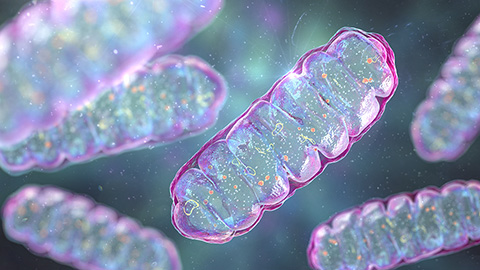Researchers identify new way to attack herpesviruses
A new study published this week in the journal mBio has opened the door to a new approach to attacking herpesviruses. The study demonstrated that targeting two metal ion-dependent enzymes of human herpesviruses with two compounds can inhibit the replication of the virus. The finding provides new opportunities to developing agents against herpesviruses.
“A lot of people know the herpes simplex viruses, but there is actually a family of 9 different herpesviruses including cytomegalovirus (CMV) which causes a lot of problems for immunocompromised people, folks getting transplants and chemotherapy patients for example. We need better therapeutic agents that can be used in these very vulnerable populations,” said co-author of the study Dennis Wright, professor of medicinal chemistry in the School of Pharmacy at the University of Connecticut. “Right now, the therapeutic agents that are out there aren’t terribly effective in terms of being able to treat all the viruses, and many of them have a significant dose-limiting toxicities and associated side effects."
Ideally, said Wright, there would be one drug that would inhibit the reactivation of all nine herpesviruses. Co-study author Sandra K. Weller, a distinguished professor of molecular biology and biophysics in the School of Medicine at the University of Connecticut, identified targets that would allow just that. She identified herpesvirus enzymes that require two magnesiums for the herpesvirus to replicate.
“The majority of drug discovery efforts against herpesviruses has focused on nucleoside analogs that target viral DNA polymerases. We are pursuing a strategy based on targeting two-metal-ion-dependent viral enzymes,” said Weller.
The researchers tested the ability of a panel of compounds to inhibit specific two metal ion-dependent enzymes as well as herpesvirus replication. The panel of compounds tested included HIV integrase inhibitors, the anti-influenza agent baloxavir, 3 natural products previously shown to exhibit anti-herpes simplex virus activity, and two 8-hydroxyquinolones, AK-157 and AK-166.
While HIV integrase inhibitors have been reported to inhibit replication of herpesviruses, the researchers found the integrase inhibitors exhibited weak overall anti-HSV-1 activity. However, the researchers found that 8-hydroxyquinolones displayed strong antiviral activity against both HSV-1 and CMV and could inhibit one or more of the two metal ion dependent enzymes. This opens up the possibility of potentially developing dual targeting agents against herpesviruses.
This article was adapted from a press release by the American Society for Microbiology. It has been edited for style.
Enjoy reading ASBMB Today?
Become a member to receive the print edition four times a year and the digital edition monthly.
Learn moreGet the latest from ASBMB Today
Enter your email address, and we’ll send you a weekly email with recent articles, interviews and more.
Latest in Science
Science highlights or most popular articles

From humble beginnings to unlocking lysosomal secrets
Monther Abu–Remaileh will receive the ASBMB’s 2026 Walter A. Shaw Young Investigator Award in Lipid Research at the ASBMB Annual Meeting, March 7-10 in Washington, D.C.

Chemistry meets biology to thwart parasites
Margaret Phillips will receive the Alice and C. C. Wang Award in Molecular Parasitology at the ASBMB Annual Meeting, March 7-10 in Washington, D.C.

ASBMB announces 2026 JBC/Tabor awardees
The seven awardees are first authors of outstanding papers published in 2025 in the Journal of Biological Chemistry.

Missing lipid shrinks heart and lowers exercise capacity
Researchers uncovered the essential role of PLAAT1 in maintaining heart cardiolipin, mitochondrial function and energy metabolism, linking this enzyme to exercise capacity and potential cardiovascular disease pathways.

Decoding how bacteria flip host’s molecular switches
Kim Orth will receive the Earl and Thressa Stadtman Distinguished Scientists Award at the ASBMB Annual Meeting, March 7–10, just outside of Washington, D.C.

Defining JNKs: Targets for drug discovery
Roger Davis will receive the Bert and Natalie Vallee Award in Biomedical Science at the ASBMB Annual Meeting, March 7–10, just outside of Washington, D.C.

